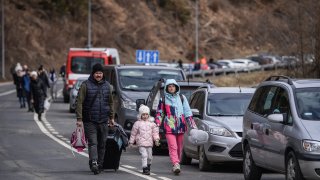
- "Infectious diseases ruthlessly exploit the conditions created by war," said Dr. Bruce Aylward, a senior advisor at the WHO.
- Aylward said refugees are particularly vulnerable to severe disease and death in the conditions created by war.
- WHO Director-General Tedros Adhanom Ghebreyesus called for a safe humanitarian corridor to deliver medical supplies to Ukraine.
- The WHO declined to name Russia as the aggressor.
The WHO on Wednesday said the mass displacement of people in Ukraine will increase Covid transmission, warning that large numbers of people are at risk of severe disease as oxygen supplies are critically low.
"Infectious diseases ruthlessly exploit the conditions created by war," Dr. Bruce Aylward, a senior advisor at the WHO, said during a press briefing in Geneva, warning that refugees are particularly vulnerable to severe disease and death in wartime.
At least three major oxygen plants are now closed in Ukraine due to the fighting, according to the WHO. Director-General Tedros Adhanom Ghebreyesus said medical supplies delivered to Kyiv before Russia invaded the nation are currently inaccessible. Tedros called for a safe humanitarian corridor to deliver critically needed medical supplies to Ukraine. There's also a shortage of cancer medicine and insulin, according to the WHO.
We're making it easier for you to find stories that matter with our new newsletter — The 4Front. Sign up here and get news that is important for you to your inbox.
The WHO director added the mass displacement of people will increase Covid transmission, also putting increased pressure on health-care systems in neighboring countries.
"Prior to the conflict, Ukraine experienced a recent surge of cases of Covid-19," Tedros said at the press conference. "Low rates of testing since the start of the conflict mean there is likely to be significant undetected transmission coupled with low vaccination coverage. This increases the risk of large numbers of people developing severe disease."
Tedros said health facilities have come under attack during the war — without naming Russia. When asked to name Russia as the aggressor, WHO's head of emergencies programs, Dr. Mike Ryan, said the global health agency does not want to get involved in politics. He did, however, ask Moscow to reconsider its stance.
Money Report
Ryan said the WHO is delivering surgical equipment for skin and bone grafts and amputations. A shipment of 36 metric tons of medical supplies for trauma care and surgery will arrive in Poland on Thursday to meet the needs of 1,000 patients and other supplies to help 150,000 people in Ukraine, Tedros said.
The United Nations relief agency has warned that the risk of another Covid contagion is growing as hundreds of thousands of people flee the Russian invasion to Ukraine's neighbors in Poland and elsewhere in Europe. Ukraine suffered a 555% increase of Covid cases, driven mostly by omicron, in January and February, according to a report from the U.N. Office for the Coordination of Humanitarian Affairs.
The relief agency warned that a Covid outbreak, on top of people injured in the war, will put even more pressure on Ukraine's health-care system, which is already stretched thin.
Europe has recorded more than 5.5 million Covid cases in the past week, down 24% from the week prior, according to data from the WHO. More than 22,000 people have died from Covid in the past week in Europe, according to the data.
Covid cases are declining in every region of the world except the western Pacific as the omicron wave subsides. More than 10 million new infections and 60,000 deaths were reported globally in the past week, according to the WHO.
Correction: The WHO will ship 36 metric tons of medical supplies for trauma care and surgery for Ukraine, which will arrive in Poland on Thursday. A previous version of this story misstated the number.






